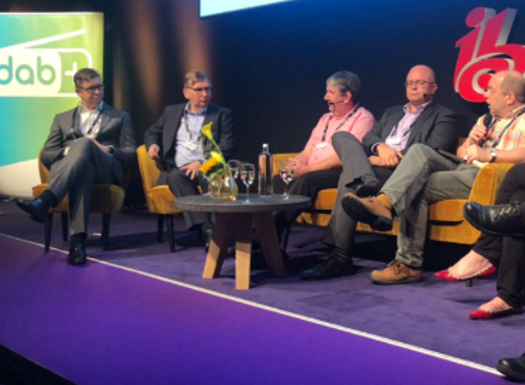More than 100 people attended WorldDAB's IBC seminar “Radio's Digital Strategy” last Monday, exploring the importance of radio within a larger digital framework, and how 4G mobile technology alone cannot support the delivery of radio.
Lindsay Cornell, Principal Systems Architect at the BBC moderated this year’s WorldDAB strategy session at IBC. Whilst the main focus was on how DAB and DAB+ are firmly at the heart of the fast-evolving new digital landscape – that includes the likes of Google, Amazon, Sonos and Apple – a key warning to emerge from new research is the importance of preserving a broadcast digital radio infrastructure. We cannot rely on mobile networks alone for the delivery of radio.
Broadcast and IP – fact vs fiction
How well can 4G mobile networks really deliver radio? Not well enough. We heard the results of a study just completed by Arqiva – who run much of both the UK broadcast and mobile network infrastructure. Despite testing with “the best network, best device and best player,” using a mobile to receive radio, 4G failed at multiple hotspots, traffic jams and rural areas.
Further, they see the scenario getting worse when they tried to calculate for future consumption. “We think it is actually video consumption not radio consumption, that will swamp the networks leaving little room for radio and therefore radio performance for the end user will be a poor quality of service,” said Simon Mason from Arqiva.
Joan Warner, in the final keynote, added to Mason’s example saying that information from 5G presentations she has attended was, “quite alarming”. Virtually every speaker also independently cited natural disasters and weather conditions – even in developed countries such as Switzerland – where it was clear that a mobile network would not support emergency situations.
A multi-platform world where radio is king
A major theme was integration of DAB with other technologies for a full listener experience and long-term health of radio.
- Today, radio dominates audio consumption in the UK at 76% and is around 68% in Australia.
- Triton’s Daniel Karlsson argued that radio will remain dominant in audio and benefit in a world where only audio advertising is not affected by advertising fraud – a huge problem online.
- Graham Dixon, Head of Broadcasting for the EBU, argued that the hybrid model of DAB and IP has the advantage of letting us analyse best sound and best signal, and asks if we should be paying more attention to that aspect (as well as additional data and now playing.)
Voice activation devices don’t recognise most local stations
Not surprisingly voice activation figures are exploding and received a lot of attention. It’s not all plain sailing however. Joan Warner urged every country to learn from the Australian experience with voice activation. “We think that if people use a home device for radio and it doesn’t work, they won’t use it again,” said Warner.
- In one case a device only found stations 23% of the time.
- They carried out a huge amount of work directly with manufacturers.
- A Google test lab looked at every smaller station and regional accents.
Graham Dixon, Head of Broadcasting for the EBU echoed similar experiences working in Europe. And whilst work may be needed on generic voice-activated devices, Dixon unveiled the prototype of a dedicated voice-activated radio on the EBU stand and urged attendees to visit.
Fake News and Good News from around the World
We also heard an update on the Norwegian FM switch-off and ‘fake news.’ Ole Jørgen Torvmark categorically refuted rumours that Norway would ever switch on FM again, and gave robust statistics on both the huge financial savings as well as listener experience.
- In Belgium, public broadcaster VRT has built technology for editors and producers to run ‘Near Live’ broadcasts within minutes or short time after the live transmission.
- The European Union is supporting DAB with the new directive on DAB receivers in cars and many European countries are taking up the new international DAB+ logo.
- We heard examples from Australia and the UK of how broadcasters are increasing revenues with brand extensions.
- A regional German Rock station has gone national thanks to the extra space provided by DAB.

